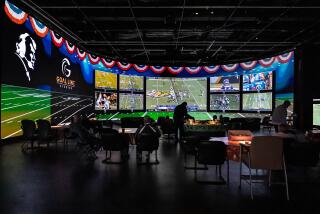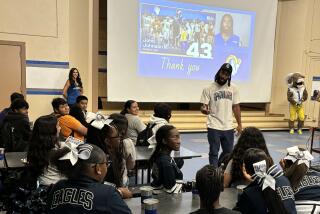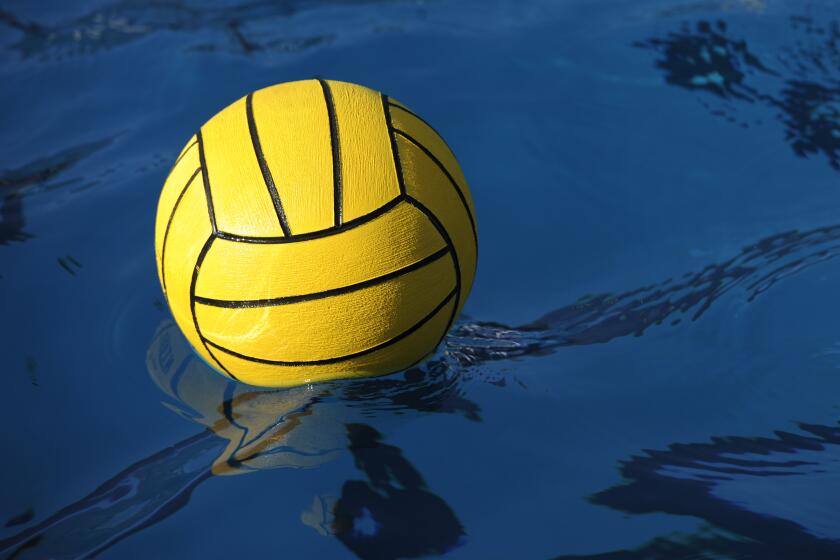Cal State Coach Helping British Bulldogs Sink Teeth Into U.S. Football
The man who penned a book about how to watch football recently showed 23 Englishmen how to play the game that is on the minds and TV sets of so many Americans during autumn weekends.
John Johnson, who played and coached football at UCLA and now coaches golf and teaches physical education at Cal State Dominguez Hills, coached a makeshift team known as the British Bulldogs in its inaugural contest on U.S. soil last month at Caltech in Pasadena.
The undermanned and inexperienced Bulldogs, a collection of amateur players from a number of British teams, actually knew how to play football before leaving England--just not very well. They lost to Caltech’s Beavers, 22-7.
After the game the opposing coaches solidified plans for a rematch between the Beavers and another group of Englishmen. And it wouldn’t surprise Johnson if that rematch ended in the Bulldogs’ favor.
Johnson, Cal State’s first-ever athletic director, is a pioneer of sorts. He helped establish college football’s Hula Bowl in Hawaii in 1957 and organized the Japan Bowl 19 years later. It was in Japan, where he said 68,000 screaming Japanese loved the game but had little idea of what they were watching, that Johnson got the idea for his book, “How to Watch Football.” Now, with football being played in several Western European countries and soon to be introduced in the Soviet Union, Johnson believes a World Cup in American football--call it the Global Bowl --is a distinct possibility.
“The future is unlimited,” he said.
Johnson believes the British knack for the game is growing rapidly, as it is in Australia, where the Bulldogs traveled one day after the Caltech game to play that country’s national team, the Kookaburas. But Johnson, who periodically coached the Kookaburas this year and last, said the British are far more advanced.
“We had a lot of Australians who had never played football,” Johnson said. “In England they have been playing for five years, so they know the game.”
The Bulldogs’ skills, however, weren’t immediately evident on the practice field or against the Beavers. At practice, players leisurely throwing around a ball looked more like they were gingerly tossing an egg. At Caltech, holes opened in the Bulldogs’ defense by the Caltech offensive line looked as wide as the English Channel.
The weak line play could be attributed to the Bulldogs’ poor technique at some positions, said Caltech Coach Lynn Parker. But if so, Johnson said, it was no reflection of the Bulldogs’ desire to play.
“They love the game,” Johnson noted. “They are dedicated.”
They must be. Each player paid $2,000 for the Bulldogs’ 3-game World Tour 1988. And back in England, players buy their own uniforms and practice two or three nights a week with amateur teams like the Ipswich Cardinals and the Nottingham Hoods.
One Bulldog earns a living as a carpenter, one as a surveyor. Another sells cars.
“It’s like with the Australians,” Johnson said. “We had one guy who was a butcher, one was a pilot, one a coal miner, one a policeman. They’re from all walks of life, and they are just guys who want to play football.”
Informally known as the team spokesman, defensive lineman Chris Rodgers stressed that the Bulldogs are more than simply ambassadors of American football’s British version.
“We are not stupid; we came here to play a good game,” Rodgers, 29, said before kickoff against Caltech. “We are gonna see if we can show you Yanks a thing or two.”
Rodgers, at 6-3 and 270 pounds, is one of eight Bulldogs who weighs in at 230 pounds or more. Frames like his could make waves in rugby. Several Bulldogs played that primarily amateur game before discovering football. But not one ever played competitive soccer--their country’s most popular and most controversial sport. Which partly explains their distaste for the sport known around the world as “football.”
Offensive lineman Scott Sharkey, reportedly not one to squelch his opinions, explained his understanding of the difference between football and soccer.
“In American football,” Sharkey, 21, said, “the violence is on the field and that is why people love to come and see it. They know they can watch guys kicking the . . . out of each other, and they are all happy.
“In soccer, every club has what they call casuals. These guys don’t play. They go and fight before the game, during the game and after the game. It is called organized football hooliganism.”
Defensive lineman Mark Beardwood, 20, described soccer spectators in England as 98% male. “I would take a woman and a kid to a football match but never to a soccer match,” Beardwood said.
Johnson and many of the Bulldogs view football as a “family game.” They went to see the San Diego Chargers play and several fights broke out in the stands behind them. The players were surprised, Johnson said, but not discouraged.
The task now, said Bulldog manager and sports publicist Richard Wood, is to market this “family game” in England, where more than 150 teams compete at a variety of skill levels. For that, corporate sponsorship and the coaching know-how of Americans like Johnson are essential, Wood said.
The only problem is, current investment in British football isn’t enough to obtain high-quality coaches. “John Johnson has a wealth of experience and it is the type of coaching that we could not afford to bring across to the U.K.,” Wood said.
The alternative is to bring British players to the U.S, which, incidentally, not only provides a group of Englishmen with a chance to learn the finer points of America’s autumn passion but gives a group of Americans--the Beavers, for instance--an opportunity to carouse the English way after the game when teams compare social talents in local taverns.
The Bulldogs and Beavers headed for a British pub in Pasadena.
“We had one of the greatest football parties I have ever been part of,” Parker said. “The English guys got our guys on tops of tables and chairs singing. But when it came to handling all the pints of beer, the English were far and away more skilled than my little scientists.”
More to Read
Get our high school sports newsletter
Prep Rally is devoted to the SoCal high school sports experience, bringing you scores, stories and a behind-the-scenes look at what makes prep sports so popular.
You may occasionally receive promotional content from the Los Angeles Times.






